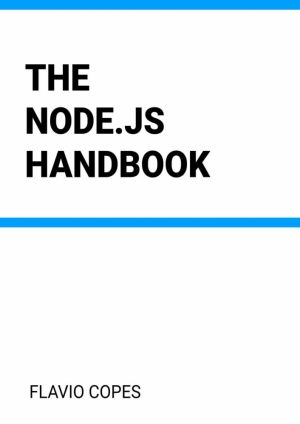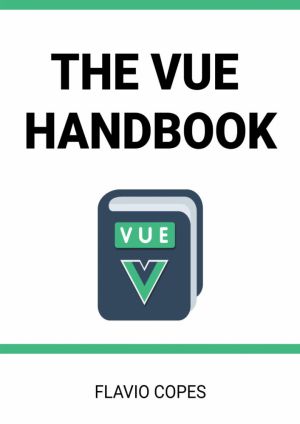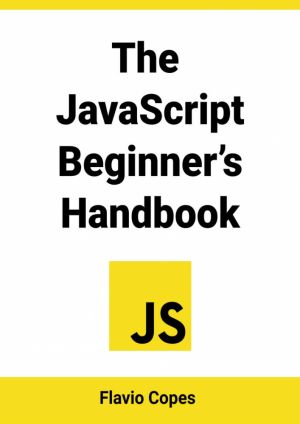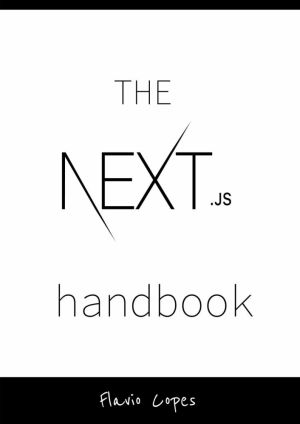The Next.js Handbook
by Flavio Copes
DescriptionTable of ContentsDetailsHashtagsReport an issue
The ideal reader of the book has zero knowledge of Next.js, has used React in the past, and is looking forward diving more into the React ecosystem, in particular server-side rendering.
I find Next.js an awesome tool to create Web Applications, and at the end of the book I hope you'll be as excited about it as I am. 





Book Description
The author wrote this open book to help you quickly learn Next.js and get familiar with how it works.The ideal reader of the book has zero knowledge of Next.js, has used React in the past, and is looking forward diving more into the React ecosystem, in particular server-side rendering.
I find Next.js an awesome tool to create Web Applications, and at the end of the book I hope you'll be as excited about it as I am.
This open book is licensed under a Open Publication License (OPL). You can download The Next.js Handbook ebook for free in PDF format (8.6 MB).
Table of Contents
Chapter 1
Introduction to Next.js
Chapter 2
The main features provided by Next.js
Chapter 3
Next.js vs Gatsby vs create-react-app
Chapter 4
How to install Next.js?
Chapter 5
View source to confirm SSR is working
Chapter 6
The app bundles
Chapter 7
What's that icon on the bottom right?
Chapter 8
Install the React Developer Tools
Chapter 9
Other debugging techniques you can use
Chapter 10
Adding a second page to the site
Chapter 11
Linking the two pages
Chapter 12
Dynamic content with the router
Chapter 13
Prefetching
Chapter 14
Using the router to detect the active link
Chapter 15
Using next/router
Chapter 16
Feed data to the components using getInitialProps
Chapter 17
CSS
Chapter 18
Populating the head tag with custom tags
Chapter 19
Adding a wrapper component
Chapter 20
API Routes
Chapter 21
Run code only on the server side or client side
Chapter 22
Deploying the production version
Chapter 23
Deploying on Now
Chapter 24
Analyzing the app bundles
Chapter 25
Lazy loading modules
Book Details
Title
The Next.js Handbook
Subject
Computer Science
Publisher
Self-publishing
Published
2019
Pages
102
Edition
1
Language
English
PDF Size
8.6 MB
License
Open Publication License
Related Books

Node.js is built on top of the Google Chrome V8 JavaScript engine, and it's mainly used to create web servers - but it's not limited to that.
The Node.js Handbook follows the 80/20 rule: learn in 20% of the time the 80% of a topic. The author find this approach gives a well-rounded overview....

Vue.js is a very impressive project. It's a very popular JavaScript framework, one that's experiencing a huge growth. It is simple, tiny and very performant.
The Vue.js Handbook follows the 80/20 rule: learn in 20% of the time the 80% of a topic. The author find this approach gives a well-rounded overview....

When you combine the sheer scale and range of digital information now available with a journalist's "nose for news" and her ability to tell a compelling story, a new world of possibility opens up. With The Data Journalism Handbook, you'll explore the potential, limits, and applied uses of this new and fascinating field.
This ...

The React Beginner's Handbook follows the 80/20 rule: learn in 20% of the time the 80% of a topic. The author find this approach gives a well-rounded overview.
This book does not try to cover everything under the sun related to React. It focuses on the core of the language, trying to simplify the more complex topics. The author hopes the co...

This book provides a practical and self-contained overview of the Gene Ontology (GO), the leading project to organize biological knowledge on genes and their products across genomic resources. Written for biologists and bioinformaticians, it covers the state-of-the-art of how GO annotations are made, how they are evaluated, and what sort of analyse...

The JavaScript Beginner's Handbook follows the 80/20 rule: learn in 20% of the time the 80% of a topic. The author find this approach gives a well-rounded overview.
This book does not try to cover everything under the sun related to JavaScript. It focuses on the core of the language, trying to simplify the more complex topics. The author h...

